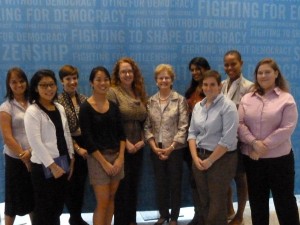Tuesday night, 10 Bryn Mawr students joined President McAuliffe at the National Constitution Center for an event hosted by Georgetown University and the Ford Foundation. This panel discussion on the National Budget was the first in a series for “A More Perfect Union: A Dialogue on American values”.
The evening’s panelists1 were leaders of different constituencies: media, politics, education, business; and the discussion was moderated by George Stephanopoulos, anchor of ABC’s Good Morning America.
The setup of the discussion was unconventional and interesting. Rather than asking the panelists to answer questions directly based on their experiences and opinions, Stephanopoulos provided a scenario with each panelist playing a particular role.
The main characters represented an “average American family”, with each member having a particular opinion about the U.S. government based on life experiences. Others played key political figures or pundits.
This approach for dialogue was interesting because panelists had the opportunity to share thoughts through the perspective and problems of ‘average Americans.’ Ultimately however, this format dissolved. And it was only then when it began to feel as though the panelists felt comfortable and when the conversation became more spirited.
Ideas about “ensuring a bright future for the next generation”, “hope” and “opportunity” were the dominant themes of the discussion. And anyone who attended the event could argue that these are some of the shared American values. However, it also became clear that although most panelists agreed with these ideals, their vision for how to mobilize these values into actions to solve the problem of the national debt differed greatly.
Therefore, I thought the discussion was a fair representation of the current state of American politics; in the end, there was no agreement or compromise. Society’s shared values matter; and it is useful to articulate these ideas because these fundamental beliefs can help Washington in making decisions about the country’s future. However, because these ideas cannot be discussed in philosophical isolation, but are defined in the context of social and economic circumstances, conflicts arise because one side, group or constituency must ultimately make the sacrifice.
Other Mawrters felt similarly about the missing action component, Noreen Neal’14 said, “I thought the panelists focused a lot on ideology, which is important, but I excepted them to talk more about actual policies. There was a lot of “we should do this or that” but no one gave a concrete answer as to executing these ideas.”
Priya Saxena ’12 described the event as unique and sometimes frustrating, but was glad to share the interesting event with other Mawrters who are interested in the topic.
However, there was no disappointment about the unfinished discussion. As mentioned before, this was only the beginning of a very interesting dialogue.
Overall, it was a great event, that sparked a lively conversation for the commute back to Bryn Mawr. I as well as the other Mawrters who attended the event look forward to hearing more of the discussion and are excited to see what other topics future events of the series will explore.
1. The guests were: Calvin O. Butts III, a pastor of the Abyssinian Baptist Church and president of the State University of New York College at Old Westbury; Richard Danzig, chairman of the Center for a New American Security and was the secretary of the Navy; John J Degioia, Georgetown University’s president; Carly Fiorina, chairman and CEO of Hewlett-Packard from 1999-2005; Juliet V. Garcia, president of the University of Texas at Brownsville; Michael Gerson, columnist for the Washington Post and was a top aide to President George W. Bush on policy and strategic planning; Michael A. Nutter, mayor of Philadelphia; Peter Orszag, vice chairman of Global Banking at Citigroup; Kathleen Kennedy Townsend, chair of American Bridge and was the lieutenant governor of Maryland and Luis Ubiñas, president of the Ford Foundation.
more information here. pictures from the event here. the program will be posted on ABCNews.com

